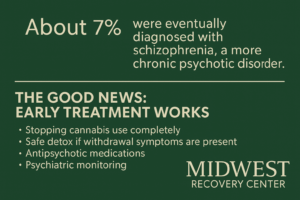At 21, Alex thought cannabis was harmless—just something to take the edge off after long days. He didn’t notice when his tolerance crept up or when his use shifted from “sometimes” to “every day.”
Then, seemingly overnight, his mind turned against him. He couldn’t sleep. His thoughts raced. Voices whispered from the corners of empty rooms. His family brought him to a local treatment center, where he learned what was happening had a name: cannabis-induced psychosis.
It wasn’t a moral failing. It wasn’t “just in his head.” It was a medical crisis—one that research now tells us is more common than many realize.
What the New Research Found
A recent study from Thailand followed hundreds of young adults hospitalized for cannabis-induced psychosis. Here’s what the researchers discovered:
- Nearly all patients improved significantly with treatment—especially when using antipsychotic medications like risperidone.
- The average hospital stay was about 28 days, giving time for symptoms to stabilize and the brain to rest.
- Most recovered quickly and were able to return to daily life without ongoing psychotic symptoms.
- About 7% were later diagnosed with schizophrenia, a more chronic psychotic disorder.
This is just one study, but it adds to a growing body of evidence: when caught early, cannabis-induced psychosis often responds well to treatment.
What Is Cannabis-Induced Psychosis?
Cannabis-induced psychosis is a severe but often temporary mental health condition triggered by marijuana use. It can happen after a single high dose or after long-term heavy use—especially with today’s high-potency products like vapes, concentrates, and certain edibles.
Symptoms can include:
- Hallucinations (seeing or hearing things that aren’t there)
- Delusions (false beliefs that feel absolutely real)
- Intense paranoia or fear
- Disorganized or racing thoughts
- Trouble speaking coherently
- Extreme agitation or confusion
Some people experience these symptoms for a few days; others need weeks or months for their brain to fully recover. For a small percentage, symptoms persist and may be diagnosed as another condition, such as schizophrenia.
Why This Can Happen, Even If Cannabis Felt “Safe” Before
For decades, cannabis was considered relatively low-risk. But the marijuana many people remember from the 90s averaged about 4% THC. Today’s joints average 15–20%, and concentrated products can contain up to 90% THC.
That’s like the difference between a light beer and a shot of pure grain alcohol—the brain’s response is not the same.
High doses of THC can interfere with brain chemistry, especially in areas that regulate perception, thought, and emotion. People who are already under high stress, have a family history of mental illness, or use cannabis frequently may be more vulnerable to psychotic reactions.
The Link Between Cannabis-Induced Psychosis and Mental Health
While cannabis doesn’t “cause” schizophrenia outright, it can trigger psychotic episodes in people predisposed to the condition. In some cases, cannabis-induced psychosis is a one-time event; in others, it can be the first sign of a longer-term mental health condition.
That’s why early treatment is so important. The faster someone gets help, the better their chances of full recovery—and the lower their risk of future psychosis.

The Good News: Early Treatment Works
The Thai study offers a hopeful message: with the right care, most people with cannabis-induced psychosis recover quickly.
Treatment often includes:
- Stopping cannabis use completely to give the brain a chance to reset.
- Safe detox in a supervised setting if withdrawal symptoms are present.
- Antipsychotic medications to stabilize mood, perception, and thought patterns.
- Therapy to help process the experience and address underlying emotional or behavioral patterns.
- Psychiatric monitoring to track recovery and watch for recurring symptoms.
Some clients also benefit from group support, where they can talk openly with others who have been through similar experiences.
Signs You Should Seek Help Immediately
If you or someone you love shows sudden changes after using cannabis—especially high-potency products—take them seriously. Warning signs include:
- Talking about hearing voices or seeing things that others can’t
- Extreme confusion or disorganized speech
- Sudden, intense fear or paranoia
- Losing touch with reality or believing things that aren’t true
- Aggressive or unpredictable behavior
It’s better to overreact and get evaluated than to wait and hope symptoms pass. Early intervention can mean the difference between a short hospital stay and a long-term condition.
You’re Not Alone—and You’re Not Broken
Experiencing cannabis-induced psychosis can be terrifying. You might feel like your mind betrayed you or wonder if you’ll ever feel “normal” again.
You’re not alone. Every year, treatment centers across the U.S.—including here in Toledo, Perrysburg, and Maumee—help people through this exact crisis.
With the right care, recovery isn’t just possible—it’s likely.
FAQs About Cannabis-Induced Psychosis
Is cannabis-induced psychosis permanent?
For most people, no. Symptoms often resolve within days or weeks after stopping cannabis and starting treatment. However, a small percentage develop ongoing symptoms or another diagnosis.
Can this happen after using cannabis only once?
Yes. While rare, some people have a psychotic episode after a single high dose, especially if it’s their first time or if they use very potent products.
Will marijuana addiction treatment help with psychosis?
Yes. Treatment addresses both the substance use and the mental health symptoms, ensuring you get comprehensive care.
What are the chances of developing schizophrenia?
The Thai study found about 7% of patients were later diagnosed with schizophrenia. Risk is higher for those with a family history of the disorder or repeated psychotic episodes.
Can I use cannabis again after recovering?
It’s strongly discouraged. Even small amounts can trigger another episode, and the risks usually outweigh any perceived benefit.
Is marijuana addiction treatment confidential?
Yes. Your privacy is protected, and you choose who knows you’re in treatment.
A Gentle Step Forward
If you’re reading this because you’re worried—for yourself or someone else—know that reaching out doesn’t lock you into anything. You don’t have to have the perfect words or be “ready” for a lifetime of change. You just have to start the conversation.
Call (888) 657-0858 or visit Midwest Recovery Center’s marijuana addiction treatment program in Toledo, Ohio to learn more about our marijuana addiction treatment services.


























